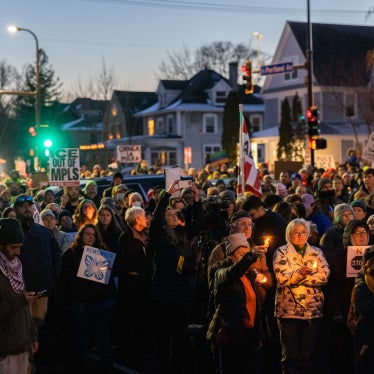(Beirut) – The Iranian authorities should immediately release the detained writer and blogger Mohammad Reza Pourshajari, who is being unlawfully held despite the expiry of a prison sentence.
On March 11, 2015, Branch 1 of the Iranian Revolutionary Court in the city of Karaj convicted Pourshajari on charges of “propaganda against the state,” and sentenced him to one year in prison and two years of internal exile in the city of Tabas. His conviction was solely on the basis of articles he had posted on his blog criticizing the Iranian authorities. Documents officials provided to Pourshajari indicated that his prison term would end on September 23, 2015. Despite this, authorities continue to detain him at the Central Prison in Karaj.
“It is outrageous that the Iranian authorities imprisoned Pourshajari in the first place, simply for peacefully exercising his right to free expression,” said Eric Goldstein, deputy Middle East director. “Keeping him locked up and then planning to keep him in internal exile only extends this unjust persecution.”
Pourshajari’s daughter, Mitra Pourshajari, told Human Rights Watch that the authorities did not provide her father any explanation for his continued detention. On October 3, Pourshajari’s family went to Branch 7 of the Revolutionary Court in Karaj to request a meeting seeking clarification with Judge Assef Hosseini, who had initially sentenced him.
Neither Hosseini nor any of the other authorities directly responsible for Pourshajari’s case agreed to speak with the family, but another judge at the court, Mohammad Shahravy, informed them that Tabas was no longer accepting people for internal exile and that the case had been sent back to Judge Hosseini to choose a new city.
Mitra Pourshajari and another source familiar with internal exile sentences in Iran told Human Rights Watch that exiled people usually pay for their own transportation to the city and are responsible for finding housing and employment. They must report regularly to the local police and are not allowed to leave the city without official permission. Pourshajari told Human Rights Watch that her father’s sentence requires him to report to the police every morning.
Pourshajari, also known by his pen name, Siamak Mehr, ran a blog called Iran’s Land Report, providing critical commentary on Iranian society and politics. In December 2010, the authorities arrested and charged him with “insulting the Supreme Leader,” “acting against national security,” “insulting religious sanctities,” and “blasphemy,” solely on the basis of his blogging activities.
He was convicted of “acting against national security” and “insulting the Supreme Leader,” and sentenced to four years in prison. Pourshajari was released on August 23, 2014, but security forces detained him again just 38 days later near the Iranian-Turkish border. They initially held him for 14 days in solitary confinement at an Intelligence Ministry detention facility in the town of Orumiyeh, where they interrogated him while he was handcuffed and blindfolded, his daughter said.
She told Human Rights Watch that her father, 55, suffers from a number of serious health conditions, including heart problems and diabetes. His health has continued to deteriorate in prison. In an open letter he wrote in August from prison to a number of human rights organizations, including Human Rights Watch, Pourshajari described the detrimental effects of imprisonment on his health and expressed concern about the ability to get necessary medical care in internal exile.
In November 2014, Human Rights Watch awarded Pourshajari and 34 other writers the prestigious Hellman-Hammett award for courage and conviction in the face of political persecution.
|
News Release
Iran: Free Writer, Repeal Internal Exile
Prison Term Ended, But Hellman-Hammett Winner Still Held
Your tax deductible gift can help stop human rights violations and save lives around the world.
Region / Country
Most Viewed
-
November 25, 2019
A Dirty Investment

-
January 9, 2026
US: Minneapolis Killing by ICE Unjustified

-
March 29, 2021
“Everything I Have to Do is Tied to a Man”

-
January 8, 2026
Iran: Authorities’ Renewed Cycle of Protest Bloodshed

-
February 19, 2014
A Wedding That Became a Funeral




